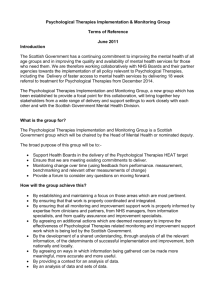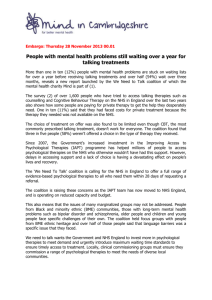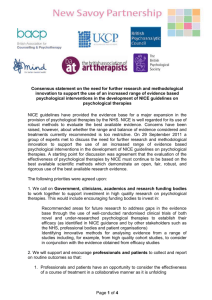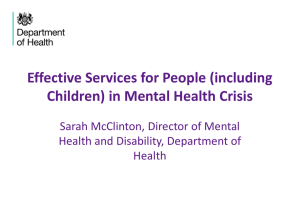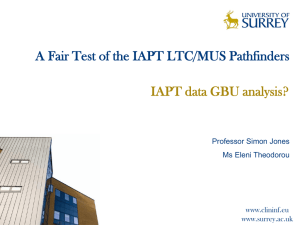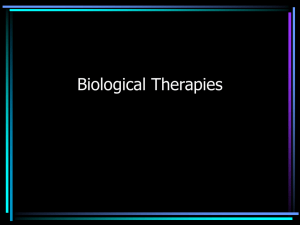presentation
advertisement
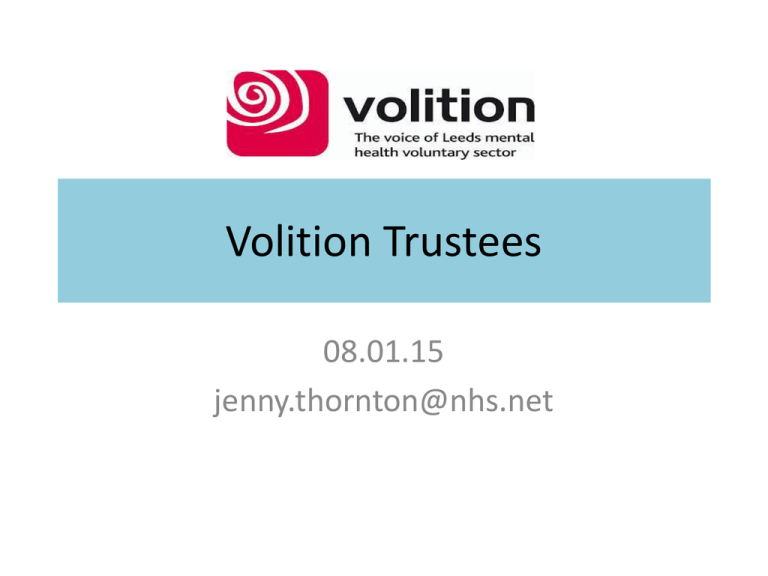
Volition Trustees 08.01.15 jenny.thornton@nhs.net Leeds Mental Health Framework 2014 -17 OUR VISION Leeds is a city that values people’s mental wellbeing equally with their physical health. “Our Ambition is for people to be confident that others will respond to our mental health needs without prejudice or discrimination and with a positive and hopeful approach to our future recovery, wellbeing and ability”. “No health without mental health” 2011 More people will have good mental health More people with mental health problems will have good physical health Fewer people will experience stigma and discrimination Mental Health Framework More people with mental health problems will recover Fewer people will suffer avoidable harm More people will have a positive experience of care and support Public Mental Health - a conceptual model derived from the WHO framework . Annual Report of the CMO 2013. Mental illness prevention Mental health promotion Treatment, recovery and rehabilitation Closing the Gap: Priorities for Essential Change in Mental Health. The “What” • Aims to bridge the gap between our long-term ambition within No Health Without Mental Health and shorter-term action. It seeks to show how changes in local service planning and delivery will make a difference, in the next two or three years, to the lives of people with mental health problems. • 25 areas where people can expect to see, and experience, the fastest changes. These are the priorities for action • To reduce the damaging impact of mental illness and improve mental wellbeing. 25 Priorities for Action Increasing access to mental health services 1. High-quality mental health services with an emphasis on recovery should be commissioned in all areas, reflecting local need 2. We will lead an information revolution around mental health and wellbeing 3. We will, for the first time, establish clear waiting time limits for mental health services 4. We will tackle inequalities around access to mental health services 5. Over 900,000 people will benefit from psychological therapies every year 6. There will be improved access to psychological therapies for children and young people across the whole of England 7. The most effective services will get the most funding 8. Adults will be given the right to make choices about the mental health care they receive 9. We will radically reduce the use of all restrictive practices and take action to end the use of high risk restraint, including face down restraint and holding people on the floor 10. We will use the Friends and Family Test to allow all patients to comment on their experience of mental health services – including children’s mental health services 11. Poor quality services will be identified sooner and action taken to improve care and where necessary protect patients 12. Carers will be better supported and more closely involved in decisions about mental health service provision Integrating physical and mental health care 13. Mental health care and physical health care will be better integrated at every level 14. We will change the way frontline health services respond to self-harm 15. No-one experiencing a mental health crisis should ever be turned away from services Starting early to promote mental wellbeing and prevent mental health problems 16. We will offer better support to new mothers to minimise the risks and impacts of postnatal depression 17. Schools will be supported to identify mental health problems sooner 18. We will end the cliff-edge of lost support as children and young people with mental health needs reach the age of 18 Improving the quality of life of people with mental health problems 19. People with mental health problems will live healthier lives and longer lives 20. More people with mental health problems will live in homes that support recovery 21. We will introduce a national liaison and diversion service so that the mental health needs of offenders will be identified sooner and appropriate support provided 22. Anyone with a mental health problem who is a victim of crime will be offered enhanced support 23. We will support employers to help more people with mental health problems to remain in or move into work 24. We will develop new approaches to help people with mental health problems who are unemployed to move into work and seek to support them during periods when they are unable to work 25. We will stamp out discrimination around mental health Why do we need the Mental Health Framework now? The NHS Mandate sets out five “domains” four of which have indicators related specifically to mental health Domain 1 Preventing people from dying prematurely Reducing premature death in people with serious mental illness Indicator: Excess under 75 mortality rates in adults with serious mental illness (PFOF) Domain 2 Enhancing quality of life for people with long term conditions Enhancing quality of life for people with mental illness Indicator: employment of people with mental illness (ASCOF, PHOF) Adult Social Care Outcomes Framework: People are able to find employment when they want, maintain a family and social life and contribute to community, avoid loneliness and isolation Indicator – number of people in contact with secondary mental health service living independently, with or without support PHOF 1.6 Domain 3 Helping people to recovery from episodes of ill health and following injury Access to psychological therapies Indicator – number of people entering therapy, recovery rate, BME access and over 65 recovery rates CCG OF Domain 4 Ensuring people have a positive experience of care Improving experience of healthcare for people with mental illness Indicator – patient experience of community mental health services Friends & Family Test indicator in development - to be introduced in mental health Feedback from consultation events in 2013 with service users, carers, clinicians and service providers identified that there is still work to do in ensuring effective joined up working arrangements between statutory and all voluntary sector providers to deliver continuity of care. The main issues with the current system are: • It is not easy to understand to anyone outside of it • There is no central point of information that describes it well • Specialist advice is not easy to access if you are outside the service • There is inconsistency of care management • The wait for talking therapies is too long • It is not consistently “outcome” focussed We also want to engage the general public, economic, social and commercial communities in Leeds, and secure their support in promoting well-being and resilience .....“Mind Out for Leeds” Local Challenges • We need to have a clearer and more integrated mental health service pathways for Leeds, that everyone can understand. • We need to integrated mental health pathways into wider services ending the perception that mental health is separate and specialist • Demand for services is unlikely to decrease, we need to use data to help design services that accommodate The needs of increasingly diverse communities The impact of the economic downturn in the city Widely different life expectancy depending on the area you live in • Expenditure on mental health needs to be re-defined with more partnership working • We need to have a centralised Information resource about mental health and mental health services in the city – making it easy for public and professionals to navigate their way to what will help. • We need to focus more on early intervention to prevent crises We will deliver the mental health framework by focussing on five Outcomes 1. Focus on keeping people well – to build resilience and self-management 2. Mental health and physical health services will be better integrated 3. Mental health services will be transformed to be recovery and outcome focussed 4. We will ensure access to high quality services informed by need 5. We will challenge Stigma and Discrimination Process for developing the Framework • • • • • • • Engagement Listening More engagement Policy drivers Local health and well-being strategy Listening to comments on Draft versions Version 1 agreed Oct 14 Agreeing the priorities for action • Support from NHS Improving Quality team Achieving Better Access to Mental Health Services by 2020. Oct 14 Phase 1 – 2014/2015: Laying the Groundwork • Drive the implementation of Closing the Gap, – Improving Access to Psychological Therapies programme – Securing nationwide sign up to the Crisis Care Concordat – The Children and Young People’s IAPT programme • New £40 million funding boost to kick-start delivery of the 2020 vision • £7 million immediately in 50 new inpatient beds and in better case management, to ensure that children with specialist inpatient needs are cared for in appropriate settings. • £33 million is being invested in Early Intervention Services for Psychosis and in rapid implementation of the Crisis Care Concordat. General Hospital Liaison and Home Treatment services Achieving Better Access to Mental Health Services by 2020 Phase 2 – 2015/2016: Implementing the first standards • In 2015/16 a further £80m will be freed from existing budgets • The refreshed NHS mandate for 2015/16 will contain the commitment that NHS England will begin planning for countrywide service transformation of children and young people’s Improving Access to Psychological Therapies. As set out in Closing the Gap 100% roll out should be achieved by 2018. • In three key areas where we have invested this year, we have agreed that the NHS Mandate for 2015/16 will introduce three access standards as a crucial starting point on a journey to parity of esteem when, with the right will, our ambitions of parity can be fully realised. In 2015/16 we will introduce the following access and waiting standards: • 75% of people referred to the Improved Access to Psychological Therapies programme will be treated within 6 weeks of referral, and 95% will be treated within 18 weeks of referral. • More than 50% of people experiencing a first episode of psychosis will be treated with a NICE approved care package within two weeks of referral. • £30m targeted investment on effective models of liaison psychiatry in more acute hospitals. Availability of liaison psychiatry will inform CQC inspection and therefore contribute to ratings The Crisis Care Concordat challenges local areas to make sure that: • Health-based places of safety and beds are available 24/7 in case someone experiences a mental health crisis • Police custody should not be used because mental health services are not available and police vehicles should also not be used to transfer patients. We want to see the number of occasions police cells are used as a place of safety for people in mental health crisis halved compared 2011/12 • Timescales are put in place so police responding to mental health crisis know how long they have to wait for a response from health and social care workers. This will make sure patients get suitable care as soon as possible The Crisis Care Concordat challenges local areas to make sure that: • People in crisis should expect that services will share essential ‘need to know’ information about them so they can receive the best care possible. This may include any history of physical violence, self-harm or drink or drug history • Figures suggest some black and minority ethnic groups are detained more frequently under the Mental Health Act. Where this is the case, it must be addressed by local services working with local communities so that the standards set out in the Concordat are met • A 24-hour helpline should be available for people with mental health problems and the crisis resolution team should be accessible 24 hours a day, 7 days a week No Assumptions. A Narrative for Personalised, Co-ordinated Care and Support in Mental Health 2014. • • • • • NICE quality standard 14 on people’s experience of adult mental health services developed with people who use and work in the services includes the quality statement “People using mental health services, and their families or carers, feel optimistic that care will be effective” People who use services want to see Joined up, preventative approaches that do not abandon them at key stages Their mental and physical health needs to be addressed together in a whole person approach Priority Aims in whole system change 1. INFORMATION All members of the public, service users and professionals can easily obtain relevant accurate information about prevention, mental health services and how to access them. 2. DATA All commissioners, clinicians and managers have access to timely relevant clinical and operational data sources that are known and shared by all to inform their decisions. 3. CHILDREN AND FAMILIES Children and families obtain appropriate professional support early in their lives. 4. CRISIS Mental health crises are prevented where possible but where they do occur service users receive timely comprehensive professional support. 5. MENTAL HEALTH IN THE COMMUNITY Community services are recovery focussed and configured to deliver sustainable recovery taking account of wider determinants. Developments to support our aims • Mental Health Crisis & Urgent care Mapping workshop 3rd February 15 • Common Mental Health pathway meetings • Information hub Workshop 3rd December 14 • Children and Young people JM JW meetings • Partnership Provider event November 14 • Dual Diagnosis Network event November 14 • Data – audit of our process of developing the Mental Health Framework November 14 Where we are now INFORMATION • Finance secured • Project support secured • Information Hub Steering group • Scope of work established and interfaces with other mhealth work-streams/links with Public Health • Branding/raising profile by Dec 15 CHILDREN AND FAMILIES • Focus on ante-natal and peri-natal mental health identification and assessment. • Developing stronger partnership working with Maternity /HV & MH services • Discussing possible scope of work within Children and Families clusters • Project support required Where we are now CRISIS • Service user experience report completed by LIP • Project support • Project Initiation Document in development • Workshop to develop new MH crisis pathway • Agree scope of work required to deliver Crisis Care Concordat requirements including Assessment of current service configuration against requirement to deliver a RAID style model of service MENTAL HEALTH IN THE COMMUNITY • Project support required • Development of complex needs enhancements to services through innovations funding 2015-16 • Agree scope of work required to deliver Better Access 2020 requirements that 75% of people referred to the Improved Access to Psychological Therapies programme will be treated within 6 weeks of referral, and 95% will be treated within 18 weeks of referral. • Achieving Better Access to Mental Health Services by 2020 Developing the Infrastructure to rebalance the system for parity between physical and mental health Laying the ground work for an equivalent system of access and waiting time standards, levers and incentives, commissioning and payment models that will place mental health services for all ages on a more level playing field with physical health. For the current year, the infrastructure priorities for the system will be: (a) Establishing the baseline position: carrying out analysis on the level and reliability of information that currently exists for mental health services across care pathways, which would help to support the work to develop access and waiting time standards. (b) Strengthening national datasets: develop definitions and data specifications that are fit for purpose to enable robust and consistent analysis of patient pathways and measurement of actual waiting times. (c) Improving data collection, reporting and assurance: assess whether there is appropriate IT infrastructure in organisations to support data capture: improve the quality of clinical coding and datasets; and establish national protocols for reporting and assurance. (d) Establishing best practice waiting time benchmarks for different services, taking account of local circumstances. (e) Collecting data on out of area placements. 2015/16 NHS Outcomes Framework domains Domain 1 Preventing people from dying prematurely Outcome sought: Reduce premature mortality in adults with common mental health problems Domain 2 Enhancing quality of life for people with long term conditions Outcome sought: Better (health-related) quality of life for people with mental health problems Domain 4 Ensuring people have a positive experience of care Outcome sought: Patient experience of community mental health services Friends & Family Test indicator to be introduced in mental health Raising the profile of the Mental Health Framework • • • • • • • • • • Children’s commissioner 16th September 14 LIP 24th September 14 ZIP 15th October 14 LYPFT SUN 1st October 14 Student Mental Health 22nd October 14 Volition Trustees 8th January 15 Health & Well Being Board 4th February 15 Veteran's Mental Health February 15 South & East CCG Clinical Forum 26th February 15 ASC Head of Services 12th March 15
